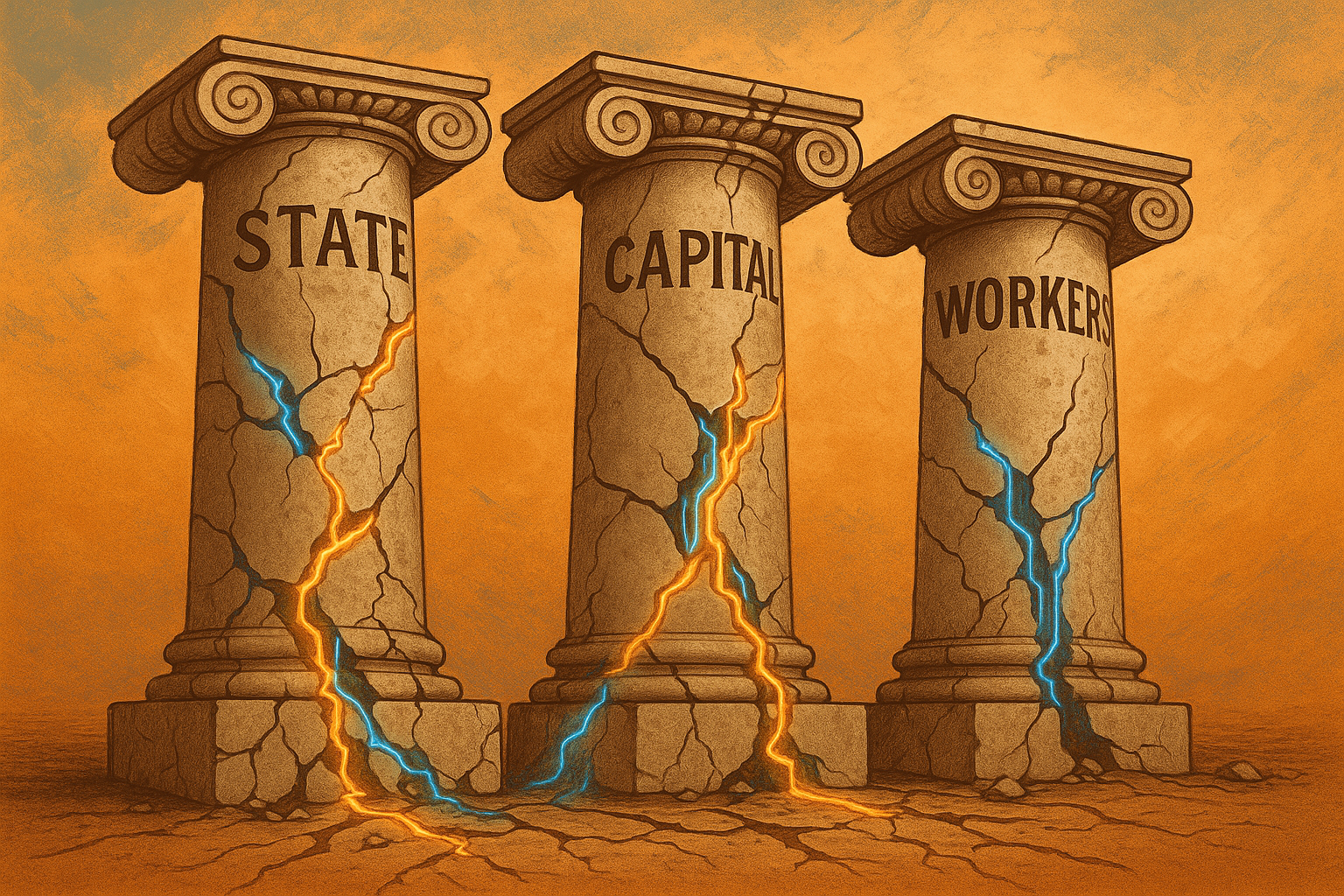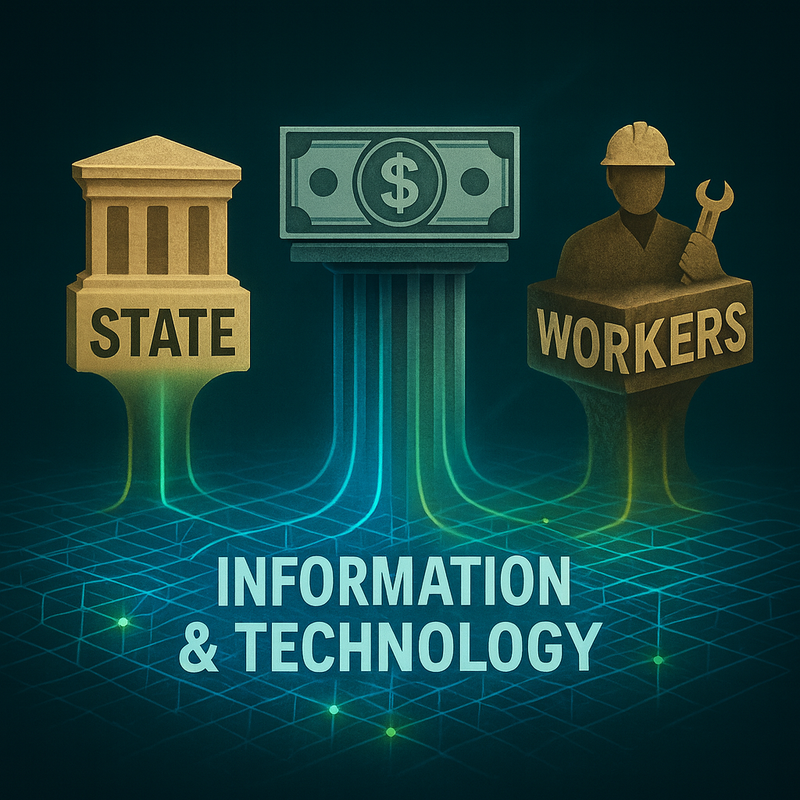The Pillars of Power are Shaking

There's a scene in Margin Call that cuts through the usual financial jargon to reveal something raw about our economic system. A senior trader, watching his world crumble during the 2008 crisis, tells a junior colleague: "If you really want to do this with your life, you have to believe you're necessary... The only reason they all get to continue living like kings is because we've got our fingers on the scales in their favor. I take my hand off, well then the whole world gets really f’ing fair, really f’ing quickly, and nobody actually wants that."
That line has stuck with me since I first saw it, echoing my own observations from the 2008 financial crash as a broke college student. These moments pull back the curtain on a system that feels fundamentally imbalanced, where the rules seem to apply differently to different players. It's a feeling that the game we are all told to play is built on a foundation that doesn’t exist.
This post is an exploration of that foundation. We will look at the hidden power structures of our economy—the pillars of State, Capital, and Workers—and analyze how global competition and the rise of intelligent automations are causing a foundational shift, forcing us to question the very nature of money, power, and success.
The Grind vs. The Game
I've spent years developing a framework of individual agency. I believe in a holistic view of net worth, where success is supported by interdependent pillars: physical and mental health, specialized skills, a strong community, and disciplined financial habits. This approach works. It creates resilience, opens opportunities, and builds genuine value in one's life. But here's the uncomfortable truth: even perfect execution of this personal framework bumps up against structural realities.
The traditional employer-employee relationship, regardless of how skilled or networked you become, is designed to capture most of the value you create and funnel it upwards. You can be the most productive engineer, the most innovative developer, the most dedicated professional—and still find yourself on the wrong side of an equation where a small group captures the surplus generated by the many.
This isn't about the game being "rigged" in some conspiratorial sense. It's about recognizing that success in capitalism often means something very different from what we're taught. The system doesn't reward just hard work or innovation; it rewards ownership and position within the hierarchy.
A Tale of Three Models
To understand where we're headed, let’s think about the economic system as a negotiation between three core pillars: the State (government), Private Capital (corporations), and Workers (labor force). How these three interact determines everything from your paycheck to global trade wars.

- The American Model: Features a powerful alliance between State and Private Capital. The government creates conditions favorable to private enterprise, sometimes intervening to save it (i.e. 2008 bailouts), while corporations influence policy through lobbying and political contributions. Workers, despite being the majority, have the weakest voice in this arrangement.
- The Chinese Model: Flips the script with a dominant State directing Private Capital as a tool for national strategy. It's a 50/50 hybrid that's produced the fastest poverty reduction in human history. Private enterprise thrives, but under state guidance and control. Workers still lack direct power, but the state claims to represent their interests.
- The Theoretical Alternative: What if Workers had direct democratic control over Capital? Imagine workplaces where major decisions—what to produce, how to distribute profits, whether to automate—were made collectively by all employees, not just boards of directors. It's not about government control or pure private ownership, but about democratizing the fundamental relationship of production.
Each model emerged from specific historical conditions. The American model arose from post-WWII dominance. The Chinese model from a century of poverty and humiliation. The democratic workplace model? Perhaps it emerges from our current moment of technological disruption and growing inequality.
The Great Accelerator: The Rise of the Machine
But here's where everything changes. We're not just debating different flavors of capitalism anymore. Cognitive machines and automation represent a fourth force that scrambles all existing models.
This isn't just another technological shift. It's rewriting the fundamental rules. When machines can do cognitive work—not just manual labor—the very nature of the employer-employee relationship transforms. The traditional bargaining power of workers, already weakened, faces potential elimination.
Consider this: every previous economic model assumed human labor as its foundation. Whether capitalist, socialist, or communist, all systems organized around the question of how to deploy human effort. But what happens when that assumption breaks?
The Unraveling: Currency, Labor, and the Future of Power
This brings us to a disruptive realization about money itself. Currency, at its core, is a claim on human labor. A dollar, a euro, a yuan—these are essentially IOUs for human time and effort; flying commercial buys you a seat and a fraction of the crew’s time while flying private buys you the whole plane and their undivided attention. The entire global financial system rests on this foundation.
But if intelligent machines can replicate or exceed most human labor, what backs our currencies? When an AI can write code, design products, manage logistics, even create art—what does it mean to have a "claim on labor"?
This isn't just philosophical musing. We're already seeing symptoms of this shift. The push toward cryptocurrency, the discussions of universal basic income, the targeted milestones of achieving superhuman levels of artificial general intelligence (AGI)—these are early tremors of a foundational change.
The historical link between money and power has always assumed money could buy human effort. Kings needed gold to pay armies. Industrialists needed capital to pay workers. But if production no longer requires human input at scale, does accumulated money retain its power? Or do we see a new form of power emerge—perhaps based on control of AI systems, data, or other resources?
The global move away from dollar dominance isn't just about geopolitics. It might be the first sign that traditional currencies—all tied to human labor—are losing their relevance in an automated world.
Navigating the New Landscape
We stand at an inflection point. The old roadmap—work hard, save, climb the ladder—was built for a world that is disappearing.
The pillars of power are being rebuilt. States struggle to regulate AI firms that may outgrow their authority. Capital races to harness automation while containing its fallout. Workers face a future where withholding labor may no longer matter.
The real question isn’t which model—American, Chinese, or democratic—prevails. It’s whether “work” itself, selling time for money, becomes as outdated as feudal serfdom. What replaces it could be dystopian control by those who own AI, or a chance to reimagine society when machines drive production.
We are living through a transformation as profound as the shift from feudalism to capitalism. The rules are being rewritten, and clinging to old models will not be enough. The pillars of power are shaking; what rises in their place will define the next century.

What are your thoughts on these economic shifts? How will you prepare for a future where the definitions of work, value, and power are all being rewritten? I'd love to hear your perspective—reach out at mike@mikescorner.io




